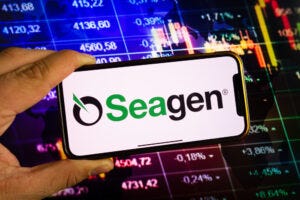March 23, 2023

Details remain scarce but Gracell Biotech inked a cell therapy development deal days before Pfizer confirmed it is set to buy Seagen.
Shanghai cell and gene therapy company Gracell announced in a press release that it had entered an unusual, non-exclusive global deal with Seattle’s Seagen to conduct pre-clinical research on Seagen’s cell therapy products and acquire (non-exclusive) rights to five of Seagen’s cell therapies.
The press release was dated March 8, 2023, which was before Seagen announced on Monday, March 13, that it would be acquired by Pfizer for $43 billion.

Image: DepositPhotos/
Piter2121
Usually, companies do not spend money developing drug candidates to which they have only non-exclusive rights. Neither Gracell nor Seagen have issued a press release explaining the agreement, though Seagen has the excuse of a $43 billion sale that required its full attention.
Gracell uses its FasTCAR and TruUCAR technology platforms and SMART CARTTM technology module to develop a clinical-stage pipeline of multiple autologous and allogeneic candidates that have the potential to overcome current drawbacks of CAR-T candidates – lengthy manufacturing time, suboptimal cell quality, high therapy cost and lack of effective CAR-T therapies for solid tumors.
Seagen is known for its ADC portfolio, though it also develops other targeted drugs for cancer. The company has four approved drugs and a pipeline that includes four groups of candidates that it categorized as follows:
Programs using Seagen’s proprietary ADC technologies
Novel antibodies and other targeted cancer therapeutics
New classes of ADC linkers that incorporate novel small molecule payloads to kill tumor cells and induce an anti-tumor immune response
Novel antibody engineering technologies
ADCs in combination with checkpoint inhibitors.
A version of this article was first published in ChinaBio Today on March 17
About the Author
You May Also Like




